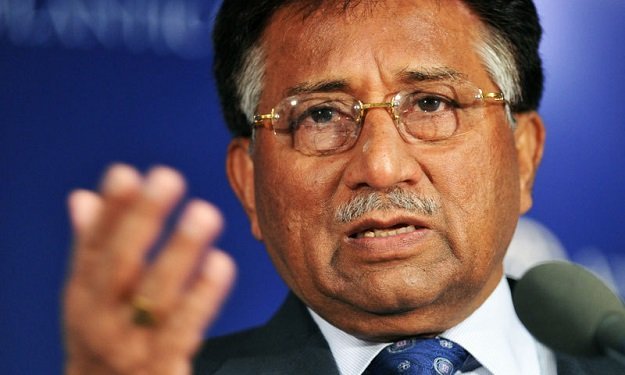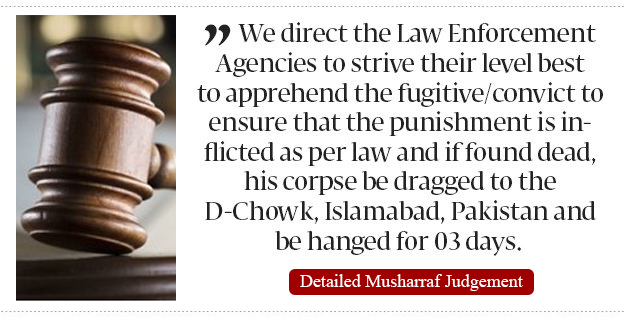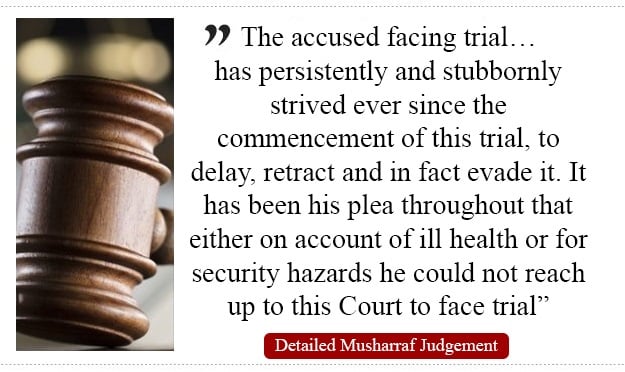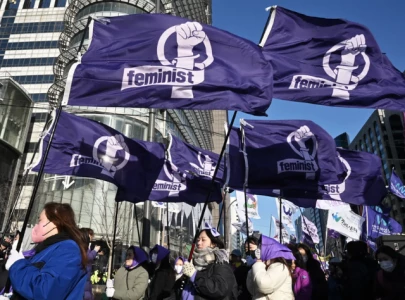
The special court ÔÇô comprising Justice Waqar Seth, Justice Nazar Akbar, and Justice Shahid Karim ÔÇô sentenced Musharraf, 76, to death on Tuesday after finding him guilty of high treason for abrogating the Constitution in 2007.
The treason charge against Musharraf, then president, stem from his imposition of emergency rule on Nov 3, 2007, after which dozens of judges were placed under house arrest or sacked, sparking widespread street protests.
The verdict was split 2-1. The 169-page detailed judgment has been authored by Justice Seth. Justice Karim and Justice Seth agreed ÔÇô on the basis of the evidence presented ÔÇô that Musharraf had committed a crime. However, Justice Akbar wrote a dissenting note.
ÔÇ£As a necessary corollary to what has been observed we find the accused guilty as per charge. The convict be therefore hanged by his neck till he dies on each count as per charge,ÔÇØ reads the verdict.
ÔÇ£We direct the Law Enforcement Agencies to strive their level best to apprehend the fugitive/convict to ensure that the punishment is inflicted as per law and if found dead, his corpse be dragged to the D-Chowk, Islamabad, Pakistan and be hanged for 03 days,ÔÇØ ruled Justice Waqar Seth, the presiding judge.

Justice Karim, while supporting Justice SethÔÇÖs judgment, opposed the dragging and hanging of MusharrafÔÇÖs body at D-Chowk. He said a death sentence was sufficient.
I dissent with the President [] it has no basis in law and will be ultra vires for this court to do so. In my opinion, it is enough to sentence the accused to death, he said.
ÔÇ£Indeed, this portion of the judgment and execution of the sentence is nowhere defined but since it is first impression case and the sentence of death is announced in his absence after declaring the convict as proclaimed offender therefore the sentence is supposed to be executed and in case of his death a sentence, to this extent para 65 prescribes the mode of execution.ÔÇØ
According to the judgment, the accused persistently and stubbornly strove ever since the commencement of the trial to delay, retract and in fact evade it. ÔÇ£It has been his plea throughout that either on account of ill health or for security hazards he could not reach up to this Court to face trial,ÔÇØ it adds.

ÔÇ£The then Corps Commanders Committee in addition to all other uniformed officers who were guarding him each and every time, with boots on, are equally and fully involved in the act and deeds of the accused person,ÔÇØ reads the judgment.
ÔÇ£The trial of high treason is the requirement of the Constitution against those individuals who undermine or attempt to undermine the Constitution by any means. This court after presentation of undeniable, irrefutable and unimpeachable evidence by the prosecution against the accused reaches to the conclusion that indeed the accused is guilty and deserves exemplary punishment.ÔÇØ
Dissenting note by Justice Akbar
Justice Akbar, in his dissenting note, said he happened to dissent with the majority view. ÔÇ£In the offence under Article 6 of the Constitution, the charging word is ÔÇÿhigh treasonÔÇÖ; therefore, without properly appreciating what does it mean, this court cannot pass a just and fair verdict,ÔÇØ he said.
ÔÇ£But for this reason, both the learned counsel for the prosecution and my learned brothers have referred to the definition of ÔÇÿhigh treasonÔÇÖ by relying on the meaning of ÔÇÿhigh treasonÔÇÖ given in the Oxford Dictionary (Tenth Edition).
ÔÇ£[Counsel] has failed to appreciate that on the date of offence, except ÔÇÿabrogateÔÇÖ and ÔÇÿsubvertÔÇÖ, no other act of any person was considered as an office under Article 6 of the Constitution. Only the act of ÔÇÿabrogationÔÇÖ and ÔÇÿsubversionÔÇÖ of Constitution was considered as an act of high treason.
ÔÇ£The words ÔÇÿsuspensionÔÇÖ and ÔÇÿabeyanceÔÇÖ were not used in the language of Article 6 of the Constitution until 20.4.2010 when [they] were introduced through the 18th Amendment almost after two and a half years to the date of alleged offence of high treason.ÔÇØ
The detailed judgment says: ÔÇ£A dictator stays in power only as long as he manages to subvert the will of his people. The usurpation of the functions of government and other organs of State established by the Constitution tantamount to subversion of the Constitution. Exercise of undue influence over judiciary (such as making them cease office and/or take fresh extra-constitutional oath) do tantamount to subversion of the Constitution.ÔÇØ

















COMMENTS (1)
Comments are moderated and generally will be posted if they are on-topic and not abusive.
For more information, please see our Comments FAQ